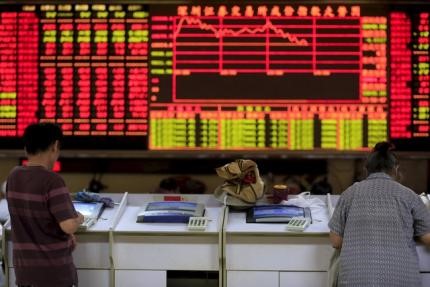By Tim McLaughlin and Jessica Toonkel
BOSTON/NEW YORK (Reuters) - Just as China shows that its domestic stock market can be something of a one-way street -- investors can put money in, but not take money out – the biggest mutual fund company, Vanguard Group, is moving ahead with plans to expose more mom-and-pop investors to the country's heavily restricted exchanges.
With the Shanghai stock exchange down by 37 percent and the Shenzhen exchange off by 43 percent during the past three months, compared with just an 18 percent drop on Hong Kong's Hang Seng Index, Vanguard is adding China mainland stocks to its $60 billion emerging markets fund in the coming year.
Vanguard says adding A-shares – stocks that trade on the Shanghai and Shenzhen exchanges, as opposed to those that trade on the Hong Kong exchange -- will diversify the fund, but acknowledges they pose unique risks related to tracking a benchmark. Steps taken by the Chinese government to restrict trading on domestic exchanges make it difficult for index funds to buy the stocks they need to replicate the performance of Chinese benchmarks, fund executives said.
When China halted most trading on the Shanghai and Shenzhen exchanges in July, for example, a Deutsche Bank (XETRA:DBKGn) exchange traded fund, the Deutsche X-Trackers Harvest CSI China A-Shares ETF, was thrown so far off track that its losses for the year have now more than doubled the index's. As of Sept. 14th, the year-to-date market price of the fund was down 14.86 percent compared to the 7.15 percent drop on the index, according to Lipper Inc data.
"Certain days had more than 50 percent of the portfolio not trading," said Dodd Kittsley, head of ETF strategy in the Americas at Deutsche Bank AG's Deutsche Asset & Wealth Management unit.
The Deutsche ETF tracks the CSI300 Index of the largest listed companies in Shanghai and Shenzhen. The fund closely tracked the index earlier in the year, according to Lipper data. In early July, the fund was no longer able to track the index as well as before after more than 1,000 mainland Chinese companies suspended trading to break the market's free fall, and in doing so took $2.4 trillion worth of stock out of play.
To combat the effects of any future trading halts, the $11 million KraneShares Bosera MSCI China A ETF has amended its registration so it can buy similar stocks outside its benchmark, if needed.
"Since we invest in the big liquid names, we didn't think it would be an issue," said Brendan Ahern, chief investment officer of New York-based KraneShares.
Vanguard says it makes sense to invest in China because it has the second largest stock market in the world by market cap and the world's second-largest gross domestic product, accounting for 20 percent of global trade and 7 percent of global consumption. The company said it plans to have an update to the fund's prospectus detailing the risks associated with A-shares, in particular, said John Woerth, a Vanguard spokesman.
For one, Vanguard funds will have to obtain from Chinese regulators enough quota of investment money to buy the shares they need to track their benchmarks. Mainland Chinese shares eventually would make up about 6 percent of the fund's assets.
"Vanguard has been very clear about the risks of the fund on our website and prospectus," Woerth said. "And we will continue to educate investors about market volatility and the additional risks that accompany investing in any emerging market."
Leading index provider FTSE Russell also said it plans to include China A shares in its widely followed emerging markets benchmark.
VOLATILE MARKET
Over time, China A-shares could comprise up to 25 percent of an emerging-markets index fund, for a total China allocation of up to 50 percent, said Patricia Oey, an senior analyst at fund research firm Morningstar Inc, referring to the Deutsche ETF. "Given the volatility of the China A-share market, a large China allocation should be a concern for investors," she said.
Currently, China is the largest allocation in emerging market indexes, but they include Hong Kong-listed stocks considered more established and less volatile than those listed on Chinese mainland exchanges in Shanghai and Shenzhen.
Foreign investors face stringent rules on moving money into and out of China's mainland stock market.
Open-end funds with a Qualified Foreign Institutional Investor (QFII) license have a three-month lock-up on their initial investment. After that, they can only repatriate their funds on a weekly basis. Investors holding less restrictive Renminbi QFII licenses do not have lock-up periods and can repatriate funds daily.
As of June 30, about 400 foreign investors had QFII and RQFII licenses with quotas of about $139 billion to invest in mainland A-shares, according to Chinese regulators.
Z-Ben Advisors, a research firm based in Hong Kong and Shanghai, predicts Chinese regulators will relax quota-driven programs such as QFII. As a result, global investment into China will increase to $2 trillion by 2020, up from a current level of $170 billion, Z-Ben estimated in a report this month.
Kittsley said he is optimistic that adding China A-shares to the MSCI Emerging Market Index, which is under consideration, would help stabilize the Chinese mainland market by bringing in long-only, institutional investors.
Not everyone shares that view.
"We just saw what China does when things get squirrelly in their markets, they intervene like crazy," said Dave Nadig, director of ETF research at FactSet Research Systems. "I don't understand (how) MSCI is going to make anything better."
It's one reason why Morningstar's Oey considers mainland China "an incredibly risky market."

"You never know what China's going to do," she said.